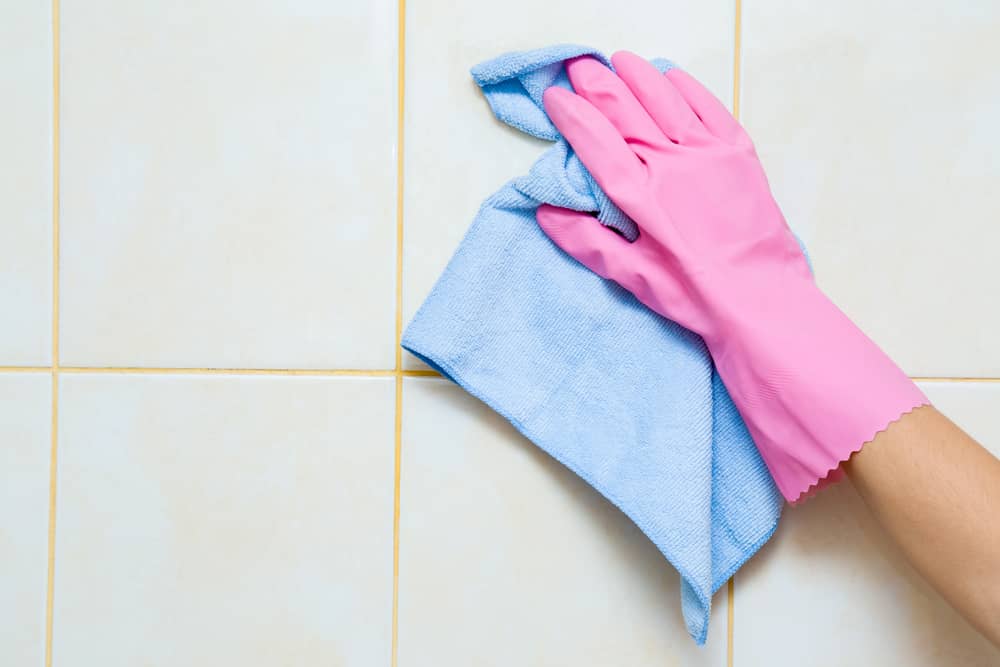Were you just happily scrubbing shampoo into your hair when you noticed a strange orange colour on your shower grout? Have you now turned to the internet for causes and solutions?
Well, you’ve come to the right place!
There are two common causes for orange grout stains in showers: iron (hard water) and pink mould.
To clean orange stains in shower grout, you can use:
- White vinegar or lemon juice
- Chlorine bleach
- Borax
- A steam machine
- Hydrogen peroxide
Since grout is a porous material, it’ll absorb most things it comes into contact with. And that means it stains easily. Clean orange grout stains in shower ASAP so you can shower with peace of mind.
What Causes Orange Stains in Shower Grout?
There are several reasons for orange grout stains in your shower. It’s essential that you identify what’s causing the problem.
1. Iron in the water
Some areas have hard water sources, which will contain high levels of iron and/or magnesium. The minerals will react with your soap to create an orange or reddish discolouration on your grout (hard water stains).
Additionally, the iron in the water will eventually oxidise (the process that forms rust), causing further staining.
2. Pink mould
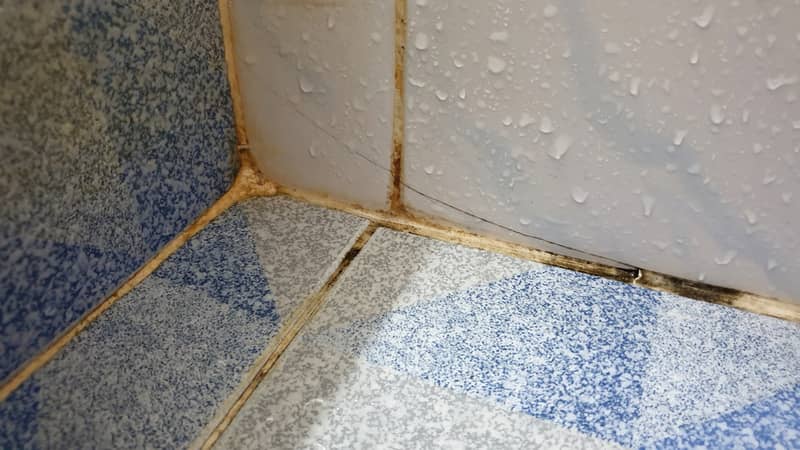
Technically, pink mould isn’t strictly mould – it’s a water-borne bacterium called Serratia marcescens. The bacteria could build up in your pipes, shower fixtures, and water tank.
Mould or bacteria often thrive in leftover soap scum, then seep into tiling and grouting.
Prolonged exposure to the bacteria in your water can cause orange or reddish stains in grout.
If your orange stains are due to bacteria in your plumbing fixtures or shower, that is an immediate health concern. Some health problems associated with pink mould include infections, respiratory issues, and gastrointestinal illnesses.
How to Clean Orange Grout Stains in Shower?
If the orange stains are becoming a problem, there are a few ways you can tackle them. Your chosen method will depend on what’s causing the discolouration.
Before you get down and dirty, though, remember to test your cleaning solution! You can apply some to the tile nearest the corner and check for any damage.
NOTE: Do NOT mix cleaning methods to remove orange stains from grout. It can be very dangerous to mix different cleaning substances – especially bleach and vinegar, which creates potentially fatal gas.
Clean orange stains from iron in the water
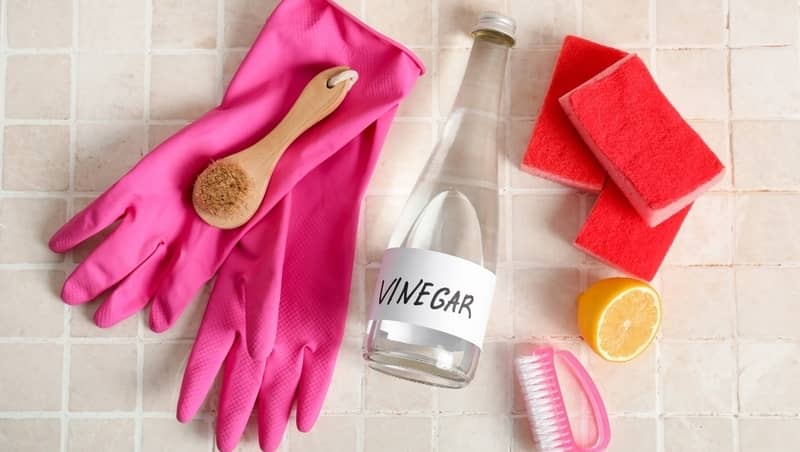
Tackle orange stains on grout caused by hard water with white vinegar or lemon juice.
Fill a spray bottle halfway with the white vinegar or lemon juice, then mix in some warm water. You can add a few drops of dish soap for extra cleaning oomph.
(TIP: Vinegar and dish soap are some of the best homemade grout cleaners for general cleaning!)
Saturate the stained grout with the mixture, working one section at a time. Let the solution sit for around 10 minutes, then use a soft-bristle brush to gently scrub the surface.
For small tiles or small spaces, an old toothbrush will do the trick.
If the stains are particularly stubborn, make a paste of equal parts baking soda and table salt with warm water. Take an old toothbrush and scrub the paste over the surface, before saturating it with the vinegar mix.
Once you’ve cleaned orange stains off grout, rinse the residue off then let your tiles air dry.
Clean orange stains from pink mould
You can also use a vinegar solution to clean orange stains from pink mould, as white vinegar is acidic. It’s also a natural way to tackle orange mould in the shower.
However, for more serious cases, chlorine bleach is your best bet.
Always wear protective equipment when using bleach – rubber gloves, eye shields, and a face mask. Open all the windows or switch on the exhaust to ensure the room is well-ventilated.
Dilute your bleach according to the instructions (about one cup per 5 litres of lukewarm water). Place the solution in a bucket.
Use a soft-bristle brush to apply the chlorine bleach mixture onto the grout. Scrub quickly, then let the bleach and water solution sit for at least 10 minutes.
Rinse the bleach from all the grout, then let the room dry.
TIP: Bleach is also one of the best products for restoring white grout. Be careful when using it, though, as direct exposure is hazardous for your health.
Other Ways to Remove Orange Stains from Bathroom Tile Grout
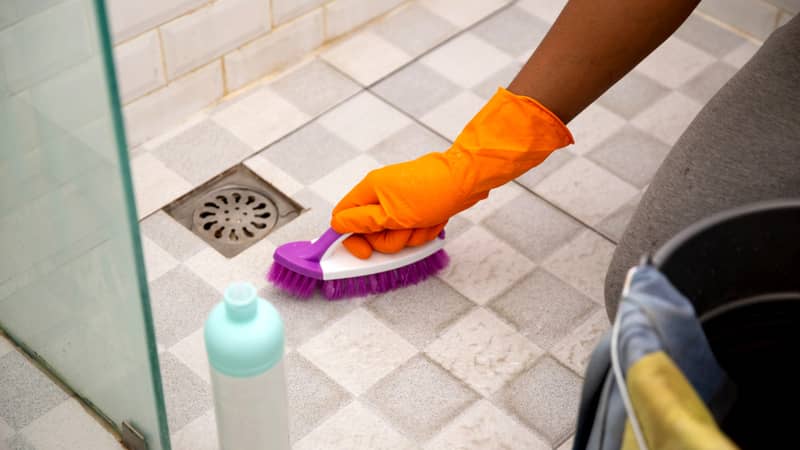
Besides chlorine bleach or white vinegar, there are other cleaning solutions for the annoying orange stains.
These will work better for mineral-based stains, however, as they might not completely eradicate mould.
1. Clean with borax
Borax is a household staple, since you can use it to clean all sorts of surfaces. And yes, it will clean orange grout stains!
If you’re going to be cleaning orange stains using borax and vinegar, wear a face mask to protect yourself.
Sprinkle the borax onto the discoloured grout, then dilute some white vinegar with warm water in a spray bottle.
Spritz the borax with the mixture to create a small chemical reaction that will clean the staining. Use an old toothbrush or soft-bristled brush to scrub the solution into the surface.
Rinse the residue away then let the tiles dry.
2. Use a steam machine
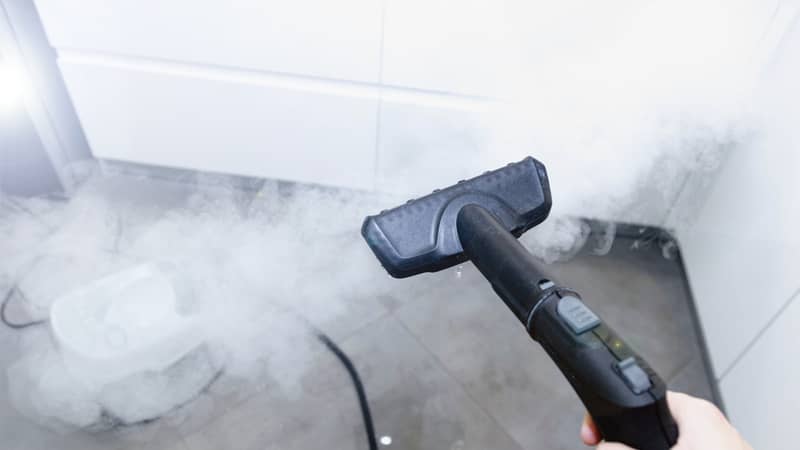
Steam can be quite powerful for cleaning, and your bathroom grout is no exception. A steam machine can help clean orange stains in your shower.
Your appliance will usually come with different nozzles, but for the narrow grout lines, a small nozzle is best.
Apply just a little bit of dish soap directly to the grout lines. Switch the steam machine on, then use the small nozzle to scrub the surface.
Follow the steam machine with a wet cloth to wipe away any residue.
3. Apply hydrogen peroxide
A milder chemical alternative to chlorine bleach would be hydrogen peroxide!
Pour some onto the stained area or mix it with baking soda. Apply the resulting paste with a sponge.
Let the hydrogen peroxide sit for at least 10 minutes before rinsing it off.
What If Orange Stains Won’t Come Out of Shower Grout?
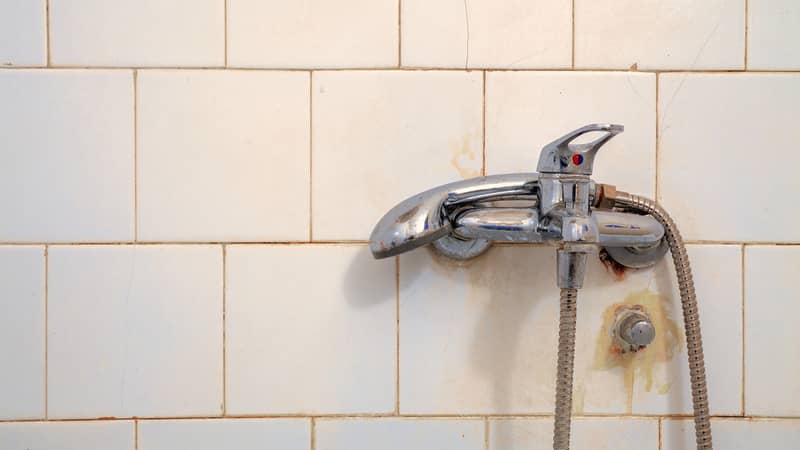
If you’ve spent hours cleaning your grout and the unsightly orangeness won’t go away, you haven’t failed! This often happens if the stains are from iron.
The grout is clean – it’s just that the iron build-up has seeped in too deep or sat on the surface too long. This leads to permanent staining.
At this point, you can either use a grout pen to recolour the lines or simply have your tiles regrouted.
How to Prevent Orange Stains on Your Bathroom Tile Grout
There are ways to stop orange stains from building up in your shower! This way, you won’t have to put in so much elbow grease to get rid of the stains when they become a problem.
(Of course, retaining a regular and reliable house cleaner will help, too.)
1. Dry the tiles between uses
Keeping a squeegee handy in the shower goes a long way to maintaining your tiles and making bathroom cleaning easier.
After you’re done in the bath, take the squeegee and wipe down the walls and doors.
You can also go the extra mile and keep a floor wiper to push excess water towards the drain.
2. Install water filtration
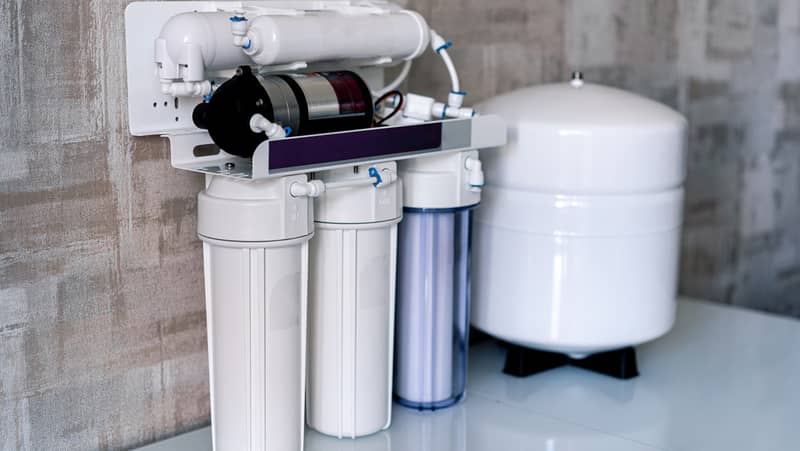
For areas that have hard water sources, install a filtration system. This will balance the mineral content of your household water, as well as filter out bacteria.
If you’re not sure whether your household runs hard water or not, have your water tested by a professional.
3. Improve bathroom ventilation
Besides using a squeegee or wiper to clean up excess water, you can improve your bathroom ventilation.
If your bathroom doesn’t have windows, install a bathroom fan or exhaust. For those who do have windows, keep them open after a shower.
4. Spray bathroom tiles with vinegar
We get it – sometimes, after a hot shower, all you want to do is tuck into bed or lounge on the sofa. Not everyone has the energy to squeegee the walls after a bath.
An alternative method for preventing orange stains in shower grout is keeping a spray bottle of white vinegar handy. Spritz the shower walls, floor, and doors to deter bacteria, mould, and staining.

